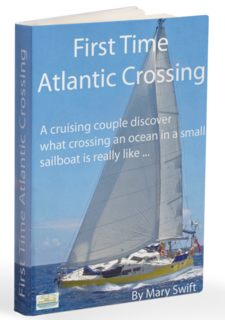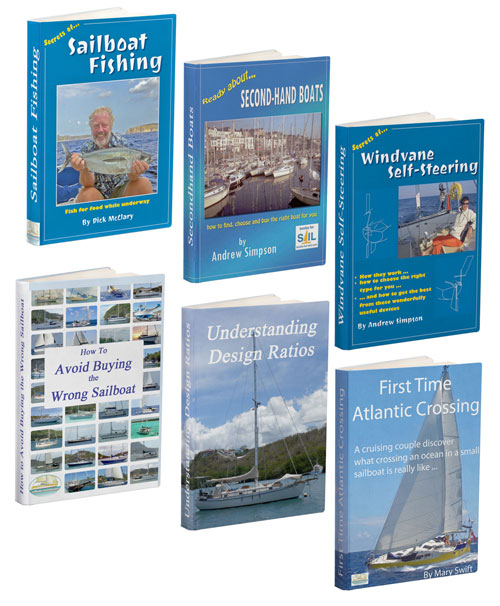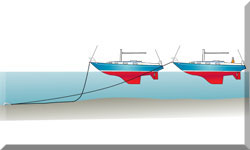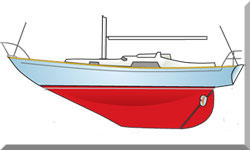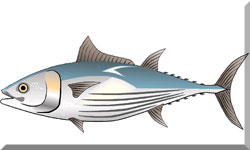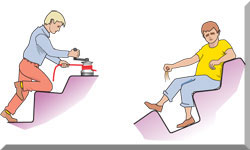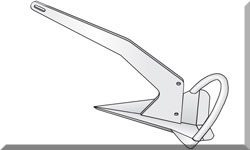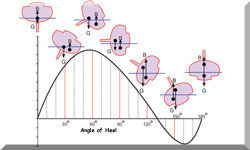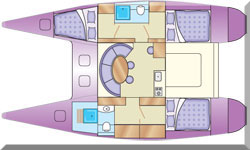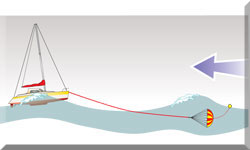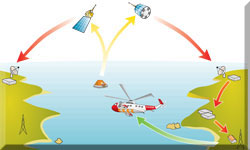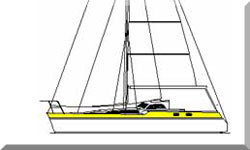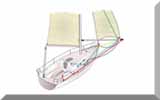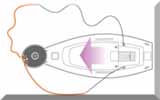- Home
- Mary's Journal
- Ocean Passage Making
Ocean Passage Making;
Portugal to the Madeira Islands
from 'The Journal of Alacazam', by Mary Swift...
Now it's getting serious. We've got some real ocean passage making to do as we set out on the first leg of our Atlantic Crossing to the Caribbean. It's time to leave the 'Marina de Portimão' on the Portuguese Algarve and sail to Porto Santo, some 500 nautical miles out into the Atlantic.
As forecast, the weather has changed overnight. The sky is clear and there's condensation on the decks, as the night had been cold.
Peter, a single-handed catamaran sailor (if you don't count his dog) on the adjacent berth agrees with us that it is a perfect time to leave; north westerly F4 to F5 winds for the next few days.
He's looking forward to the best sail he has had on 'Easy Rider' since he left Amsterdam, and we're expecting a good one too.
Tuesday 23rd October, 2001
It's 11.30am, time to leave. The weather is fabulous, hot and sunny but unfortunately the wind has died away to nothing and we have to resort to motoring. Darn...
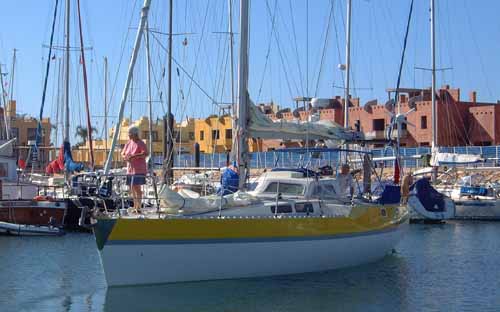 Alacazam departs Portimao Marina for Porto Santo, Madeira
Alacazam departs Portimao Marina for Porto Santo, MadeiraNot to worry, we're on our way with Peter having left an hour before us. The Sea Safari boat passes us, heading out on the same course looking for dolphins; the tourists on board wave to us and we wave back.
We expect this ocean passage to last four to five days as we set the autopilot on a southwesterly course into the open ocean.
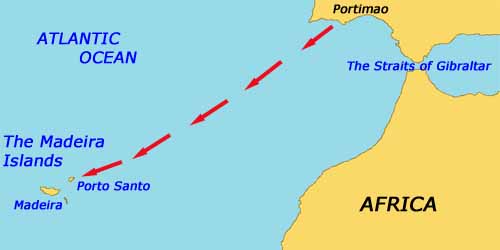 Out into the Atlantic Ocean!
Out into the Atlantic Ocean!There's a long, slow ocean swell and after a snack lunch of cheese and ham on toast I take advantage of the quiet conditions to set up the computer on the saloon table. I'm just settling down to write when Dick yells "Dolphins!" and I rush up on deck to see them swimming around the boat. I race up to the bow calling to them, and a family - three adults and two babies - swim across, playing around the yacht and turning on their side to look up at me.
They stay for ages and I call Dick forward to watch them as they jump and dive all around us. Then they are gone as quickly as they came; the first we have seen since the day we turned the corner at Cabo São Vincente into the Algarve.
I return below and work on the computer until about 4.30pm when, unusually, I feel a little queasy and need to get some air. About an hour or so earlier Dick had been able to set the sails in a north westerly force 2 to 3, sailing at 5 knots but the swell has increased along with the wind and we are now steaming along at 6 to 7 knots.
As I go on deck we are overhauling Peter's catamaran 'Easy Rider' and give him a wave. We are approaching the shipping lanes so prepare to change course to cross the lanes at right angles but there isn't too much shipping about and so we remain on the starboard tack, which is not uncomfortable in the long, deep swell.
At 5pm I think it is time to start cooking a chicken casserole and when getting the casserole dish out of the locker notice that the carpet is wet and ask Dick if he has upset any water.
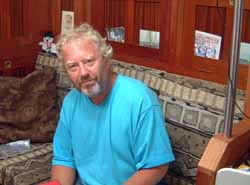 A pensive skipper
A pensive skipperHe hasn't; on pulling the carpet back I find the cabin sole is very wet indeed. Further investigation (by Dick tasting it) reveals that it's fresh water, not seawater - much relief all round.
Dick (that's him on the right) realizes what has happened. The water ballast tank has been overfilled and water is coming out of the breather pipe. Luckily there are no dry foods in this locker, only tins, and these are standing in over an inch of water.
Dick's treasured fishing tackle is kept in the saloon aft locker, but in plastic boxes, which has kept his fishing gear dry. Everything has to come out of both lockers though and we use a sponge to bale out the water and old towels to dry the lockers. I have to dry every tin and remove all the labels from over half way up the tins, as they are so wet. Some of the smaller tins have to have the whole label removed and I mark the top of the tins in ink so that I will know what they contain. What a long, laborious job, made more tortuous because both skipper and crew are feeling decidedly queasy with heads down in lockers and the swell increasing by the minute. Great stuff this ocean passage making...
I stop part way through the task to prepare the chicken and vegetables and put the casserole in the oven, wondering if I am wasting my time and if we will be able to eat it. There are big seas now, no doubt the aftermath of the fronts that have passed through moving north. We have been keeping a lookout throughout all this activity and at one time saw a large container vessel passing directly across our rear. We could see Easy Rider and thought the yacht was behind the container ship, but it was actually in front of it and from our angle of vision it looked a very close call indeed (a conversation with Peter later confirmed that it was close, but not as close as it had looked to us).
I refuse to feel seasick and manage to convince myself that I won't be (mind over matter and it works). This is a different sort of sea and I will just have to get used to it. Dick is feeling worse than me, as he gets shaky too whereas I only feel a nausea, and he does not think he can eat anything. So I turn off the oven and go to bed for an hour but the rolling motion is strange and I cannot sleep. Dick is feeling much better so I get up and serve dinner and we manage to eat most of it.
I go back to bed for the rest of my off-watch (7.30pm to 10.30pm) but cannot sleep although I am resting. We have decided to keep strict three-hour watches on this passage, logging our position every hour and plotting it on the chart every six hours, and I am up and ready to take over my watch at 10.30pm. I plot the midnight and 6am positions and Dick has plotted the 6pm position but there is an anomaly. One of us is wrong and Dick cannot believe it but it is he who has made the mistake. It is confusing for me when his navigation is wrong, because this is a rare occurrence, but I am thrilled (and so is he) that my navigation skills are improving by the day and we are becoming a team.
Throughout the night there is not much traffic; a container ship passes astern and yet two more pass either side of us at dawn. Dick had been keeping an eye on a light ahead of us, thinking we were going to overhaul another yacht but during my watch the light disappeared and we did not see it again. The night was clear and starry with phosphorescence shining in the water but neither of us saw any dolphins or whales. We could clearly see the Seven Sisters, Orion and the Plough and many other constellations that we cannot name and we both saw shooting stars.
The wind stayed a constant force 3 to 4, moving from north west into the north. Not wanting to gybe we moved slightly off course to ensure the wind was aft of the beam to keep up a speed of between 6 and 81/2 knots. There was a big sea for the amount of wind and, as before, we encountered the occasional pattern of the two large waves.
Wednesday 24th October
Getting up after my second watch, I sit in the cockpit and watch the dawn break at 6.30am, but it's another hour before it is fully light when I wake Dick. He's managed to sleep for an hour or so but we have both slept very little. We have a half hour transition period for a chat, toast and marmalade and a cup of tea and start watches again from 8am.
It's good to get into a watch routine and we're going to keep to our shift times even if we choose to stay awake (yeah-yeah). At 8.45am the GPS goes down and does not come back on again. There's a large vessel on our starboard side and Dick calls it up on the VHF and it gives us its position (which we plot on the chart) and tells us that it is m/v Kapitan Yakula on its way to Montreal in Canada.
The demise of the GPS seems terminal, and will be useless for the rest of the passage. At 11.30am Dick sets up the sextant and proceeds to take several sights to establish our latitude by meridian altitude, and our longitude by equal altitudes (or so he tells me).
There's much cursing when the sun disappears behind a cloud shortly before reaching its zenith, so he cannot calculate our latitude or our longitude. However by some form of black magic (that is by using the sight reduction tables) he does draw a position line on the chart and says "We're somewhere along that". He takes the point on the line closest to our DR position as our new estimated position, which will have to do until we can take another sight. Dick says it looks about right and seems fairly relaxed about it.
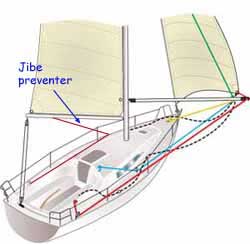 'Goosewing' set-up
'Goosewing' set-upWe're sailing almost directly downwind at about 5 knots. The foresails are doing very little and the lumpy sea causes the mainsail to swing and bang on occasion. Gybing has taken us even further off the desired course so we gybe back again.
By goose-winging (that's having the mainsail set on one side and the headsail poled out to the other) we can steer the correct course, so Dick puts a preventer on the main, drops the staysail and poles out the yankee.
We aren't sailing fast, but by using 'Arriet' (the electronic autopilot) to steer we know the exact course we are steering. There is little leeway, if any, as the wind is behind us, we have a following sea and we know from the chart that there is a southerly current of about 1/2 knot. We have 300 odd miles to go which, at the present speed of 5 knots, will take us about 60 hours. Therefore the 1/2 knot current is worth about 30 miles to us for free.
Even with everything apparently in our favour Dick is concerned, as we are sailing to a small island in a big ocean and with the present cloud cover can only rely on dead reckoning. This wasn't really the best time for the GPS to go down, but Dick some years previously had sailed his Nicholson 32 'Jalingo 2' from Poole to Gibralter using nothing more than a sextant, a walker towed log and an RDF set, so I was in good hands.
Unlike a crossing of the English Channel where you are always going to arrive at one stretch or other of the French coast, if we miss Porto Santo there's nothing else on our present course for thousands of miles. My joke of "Oh well, next stop St Lucia" does not go down too well. He's also concerned with the sextant as one of the mirrors has tarnished and he is having difficulty in drawing down the sun to the horizon. He is clearly not happy with the sight he took to cross with the earlier one.
He checks his calculations and still comes up with the same result, so either we really are in the Sahara Desert, or the sextant reading is wrong. We have not seen any other boats but I am positive we will and then we will be able to check our position. Dick is just tired and by 2pm, after a sandwich and a piece of cake, I manage to persuade him to get his head down and to try and get some sleep.
I've promised faithfully to record in the log any changes of course, times etcetera and to wake him if I see a ship. It's so important that we keep an accurate log and also to check each other's workings out when plotting our position.
At 2.40pm I wake Dick, as I have seen a large ship on the horizon heading towards us and by 3pm we have an exact position as the Star Sea Cosmos Panama (making her way to Italy) passes in front of us, so close to our bow. Our dead reckoning has been spot on and we relax a little and take notice of the colour of the sea. We have never seen it quite so blue, almost the colour of our canvas dodgers and I'm trying to think what it reminds me of. Then I have it; it's the colour of the radiant blue ink that I used to fill my fountain pen with when I was a slip of a gal at school. I always thought the sea reflected the colour of the sky but the sky is pale by comparison and covered in white fluffy clouds. The sea here is over 4,000 metres deep though; nearly 3 miles - awesome!
Dick goes back to bed and sleeps while I stay in the cockpit reading 'Cruising with Serrafyn' by Lyn and Larry Pardey. By the time I wake him at 5pm I have cooked a meal of pork chops in herbs and vegetables, a special meat meal for Dick, as I am not much of a meat eater. He gets halfway through his meal and cannot eat any more, unusual for him as he usually eats his food with relish; he's not feeling at all well and is quite feverish.
I try to keep to cooking basic fare when we are on passage so as not to get ill but Dick has been complaining of a sore throat for a few days. (I say that he has withdrawal symptoms as we don't drink alcohol on passage, but he says that is unfair of me and I shouldn't write that in the journal - as if I would). It is now my watch again so I give him two grammes of vitamin C and send him back to bed until 8pm when it will be my turn to sleep, as it is more important for Dick to be well and rested.
Alacazam is sailing well, up to 61/2 knots with the sails goose-winged, and on our correct course and I'm thoroughly enjoying the sailing. Dick feels much better when he wakes and apparently ate the remains of his dinner with his usual relish, enjoying the cold chops. I am finding it difficult to sleep and at 20.55 hours I hear Dick getting a fix from m/v Canterbury Star from a man with a 'Queen's English' accent. The vessel is sailing to Marseilles and then into the Black Sea with bananas from Ecuador. Dick suggests I move from the seaberth into the aft cabin to try and sleep, as nothing is going to happen (famous last words).
The motion is rolly so I sleep under the cockpit on the centreline and I am soon fast asleep, dead to the world. So much so that it takes Dick a while to wake me by banging on the cockpit sole and shouting loudly. I rush up into the cockpit where he asks me to quickly take the helm. 'Arriet' (the autohelm) had broken and pandemonium had broken out. Alacazam had turned a full 180º out of control and the only reason there wasn't a serious gybe was because of the preventer retaining the main and the pole holding the yankee. The sails were flapping and banging and I was so tired that I had slept right through it all. There is too much sea and not enough wind for 'Arry' (the Aries Windvane Self-Steering Gear) so I continue helming while Dick checks 'Arriet'. A shear pin has snapped where the autohelm fits into the cockpit seat; this has happened before, an obvious weakness, but Dick soon has it fixed and I go back to sleep, but in the seaberth this time.
Thursday 25th October
It's a quiet night with not much shipping around and we both sleep well on our stints (the timings though seem to have gone awry) and I wake at 6.30am to hear Dick trying to contact motor vessels on our starboard side. There are three in a row but none of them respond. At 11pm I had changed course by ten degrees, as the wind was directly behind us but two hours later there was a wind shift and we were back almost on course, although a little high and if there is no change, later on we may have to gybe onto the port tack for a while.
The sunrise is dramatic this morning. The clouds are black through to grey and the sky between them is various shades of yellow, through mustard to ochre and not the usual reds and oranges. Dick is hoping to spot another vessel soon but he also wants to get a fix from the sun today, but at the moment it's very cloudy.
When Dick wakes at 9.30am we have banana and porridge for breakfast and while I finish my book Dick revises his celestial skills. He's also going to use the celestial navigation programme on his Psion (a hand held computer) to check his sight reduction calculations. Of course that is the moment that the batteries in the Psion choose to expire but when he changes the battery (as the instructions) it doesn't save his estimated position and we're back in the Sahara.
I'm feeling tired again and lay down for an hour or so but it is 1.15pm (getting towards local noon) when I wake up. Dick is also tired but just as he settles down to sleep the sun comes out so he prepares to take a noon sight. He sets the Psion and I count down the seconds but the sun goes behind a cloud just as I start counting down the last ten seconds. Missed it again; we seem to attract the cloud, it is a grey day and we are wearing snugs and trousers. Will I ever get a suntan, I wonder?
A quick cheese and ham snack and then we gybe Alacazam onto the port tack. The wind is dropping but we are sailing at 41/2 knots and Dick poles out the yankee and sets the staysail on the same side of the main and the speed increases to 51/2 knots only for the wind to lessen even more. "Why haven't we put the kite up?" I ask. But we're too late, there's now no sun or wind, the batteries will need topping up anyway so we start the motor, take down the pole and furl the foresail.
The sun takes pity on us and comes out for just long enough for Dick to take a sight while I wait at the chart table to record the exact time when he says 'now'. Dick seems happy with this, and calculates an azimuth and an offset, which is confirmed by the Psion. Our estimated position is very close to the resulting position line, so Dick is confident that we are where we thought we were, if you see what I mean.
We haven't seen another vessel today and when Dick turns on the radar there are no boats showing in its twenty-four mile range. I take advantage of the motor and write my journal on the laptop. At 6pm we hear an Australian voice calling up another yacht and listen in on VHF channel 6. It seems there are three yachts sailing to Porto Santo and the position it gives out is not far from our estimated position, but we cannot see it on the radar. When we try to contact him he says "Go to1417Mhz" (we think) and when we say we cannot because we have no SSB transmitter and for him to go to VHF channel 6 he says "Negative".
We try to contact him again and the same thing happens so we try a few more times but he does not respond and we wonder if he is ignoring us. Perhaps these yachts are sailing with the ARC (Atlantic Rally for Cruisers) and the frequency he quoted is one that only they use. We hear them talking to each other and they have no wind and are motoring. "Right", says Dick, "We're going to sail" so up goes the pole again, the motor is switched off and when the speed has decreased to 2 knots he gives in and we start the motor again.
I'm beginning to get annoyed with Dick. He keeps saying he is going to have a sleep and then he changes his mind and starts something else. He should have had a sleep when I was working on the computer, as it was my watch and I kept popping up into the cockpit to keep watch, but he didn't and now he is tired and will be sleeping in my time but if he doesn't go to bed soon then I will. We're both tired and a bit niggled that the yacht would not respond to us and think it a bit rude really.
At this point though, he reminds me of a story that our pal Nick had told us before he left the 'Marina de Portimão' to sail to Culatra. A Swedish guy had arrived in the marina in a catamaran and reported that his wife had fallen overboard and he could not find her. Days later a fishing boat had trawled up her body complete with heavy chain tied about her legs. Ann had confirmed the story saying that the event happened about six months ago but no-one knew the outcome except that the catamaran was still impounded in the next basin. Dick says I needn't worry, as we don't have enough spare chain. Nice!
Anyway Dick finally goes to bed and I keep watch (also working on the computer in the dark) until I wake him at 11.30pm. It is a cloudy night, no moon, no stars, no wind and no other vessels so we're still motoring.
Friday 26th October
I just about fall into bed and Dick leaves me to rest until 3.30am when I wake to find that we're sailing again and have changed course. We can see a light on the horizon but it is too far away to contact and Dick goes off watch.
The light remains ahead of us, on the same course, and I think it must be another yacht that we are overhauling. I go below to make a hot drink and the yacht must have gybed, as it has crossed in front of us and is now on a different course. I wake Dick to tell him but he wants to wait a few hours before we gybe and goes back to sleep.
At 5.30am I spot another light on the horizon and whatever it is, it's approaching fast and has enough lights to light up a Christmas tree. Dick's grumpy when I wake him, but he had told me to wake him if I saw a motor vessel, and he's glad I did when he sees we are on a collision course.
He quickly contacts the vessel on VHF and is answered immediately by a pleasant voice saying he can see us and not to worry, as he will be altering course to miss us. It is a deep-sea factory trawler from New Zealand and it crosses our bow very close indeed, but not before he has given us our position. Unbelievable, so much ocean and yet so close.
Our dead reckoning is not far out but the current has taken us a little further south than we had estimated. We can still see the yacht's light but can't see it on the radar screen although we can clearly see the fishing trawler.
Just after 6am Dick decides to gybe. There is little wind and we cannot sail safely, directly to our course but we are back in line with the yacht we had seen earlier.
At 6.30am I go off watch with aching muscles and a headache, sleeping soundly until 9.30am when I wake to find Dick goose-winging the sails and muttering under his breath, but at least we are able to sail to course.
Surprisingly we can't see the other yacht as we thought we would. Earlier Dick had heard the Australian yacht Billaroo and Sugar on Halcyon talking to each other again and they're expecting to reach Porto Santo around noon tomorrow.
We have breakfast in the cockpit but Dick isn't happy with the way he has set the pole so he takes it down and tries again, this time setting it on the higher mast ring and it's much more successful. He shouts back that he's seen an unusual bird, black with a long tail but he doesn't recognise it. I see it and can't identify it either. This is the first bird we have seen for days and, disappointingly, we haven't seen any sea creatures at all.
By 11am Dick is in bed and is soon snoring loudly. My headache will not go away so I just relax in the cockpit gazing at the sea and keeping watch. At 12.30pm there's a wind shift, the preventer does its work and prevents a gybe and I quickly change course to keep the wind in the sail.
I wake Dick; the wind is now blowing east-southeast and we gybe onto the port tack (remembering to tack the water ballast and change the running backstays) and are able to sail our course with the wind aft of the beam without having to goose-wing.
Dick stays up and reads his book and I fall asleep in the cockpit for an hour and a half, feeling much better when I wake. This is the first migraine type headache I have had for a long time and I had almost forgotten what they were like. The wind is just aft of the beam and we are sailing at 71/2 knots in little wind and less swell - wonderful sailing and we are not far from Porto Santo.
We try 'Arry' on this point of sail and he handles Alacazam beautifully. 'Arriet' has been wonderful but she is a tad noisy. A yacht has tacked back into view and we are on the same course but leaving it behind (I think it is the yacht we saw earlier but Dick isn't so sure). We're hungry so I go below and prepare a large chilli-con-carne with the minced beef I bought at the butcher's in Ferragudo and by 5pm we have eaten over half of it.
By our estimation we should be about 30 miles from land and we are getting excited. It is encouraging that we can still see the yacht behind us and we check the radar screen for signs of land. At 6pm I manage to persuade Dick to make contact with the yacht behind us. On the radar screen we can see that it is 41/2 miles away and if we know its position we can chart it, take a bearing from it and we will then know our position. Yacht Excalibur obliges by giving its position, its bearing from Porto Santo and ETA. Our estimated position is spot on. "What did you expect?" says Dick
Just before dusk at around 7.30pm we eat stewed apples with mixed spice, apple juice, sultanas, and custard and when Dick goes back on deck he can see land and the lighthouse flashing three times every fifteen seconds - Porto Santo - we're about twenty four miles away.
The wind is fluky and we've been losing speed, so we start the motor. Excalibur must have been motoring for a while as it's getting closer and we estimate is an hour behind us. Once you see landfall it always seems to take forever to reach it and this time is no exception. We see a large motor vessel that appears to be going into Porto Santo but it turns and motors close by our starboard side going out on our course in, if you see what I mean.
At last we turn into the bay and it is difficult to see the orange lights of four large mooring buoys outside the harbour against the lights shining all along the bay. Only three of them are lit but by using the information given in the pilot book we locate all four moorings and turn into the harbour where there is a surprising amount of space. There're a number of yachts at anchor and by 11.15pm we have dropped ours and have settled down for the night.
Excalibur motors into the harbour about thirty minutes after us and we greet each other before they too drop anchor. By midnight we are in bed and fast asleep, with my first true ocean passage over. But soon we'll be ocean passage making again - this time to the Canary Islands in readiness for the Atlantic Crossing proper...
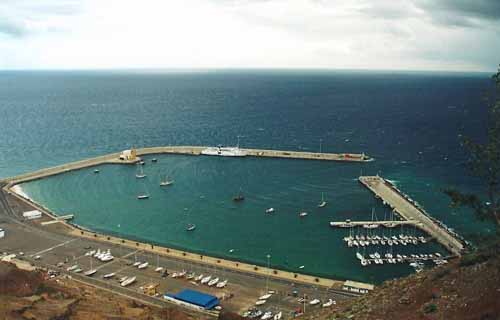 Porto Santo harbour and marina
Porto Santo harbour and marinaNext: Ocean Passage Making ~ Madiera islands to the Canary Islands
Recent Articles
-
Wauquiez Gladiateur 33 for Sale
Apr 10, 24 05:40 AM
'Kesh', my Wauquiez Gladiateur 33 is only for sale because we've decided to go for a larger sailboat. She currently berthed in Florida, USA. -
'Cabo Frio', a Catalina Morgan 43 for sale
Apr 01, 24 08:35 AM
This Catalina Morgan 43 is for sale at a very reasonable price. She offers up to 7 berths in 2 cabins + saloon. There is full 6'5" standing headroom and good ventilation throughout. -
Live Aboard Boats For Sale
Mar 30, 24 07:02 PM
Ready to live the dream? Then browsing through this listing of live aboard boats for sale might just get you on your way...
